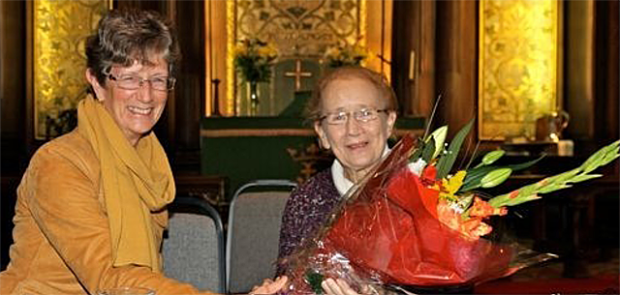Press release, The United Dioceses of Dublin & Gendalough

Changing Attitude Ireland marked the 20th anniversary of the decriminalisation of homosexuality in Ireland with a public lecture in St Ann’s Church, Dawson Street, yesterday, October 26.
The lecture was delivered by Mrs Justice Catherine McGuinness and afterwards tributes were paid to Senator David Norris for his courage and leadership in the pursuit of the decriminalisation of same sex relations. He was unable to attend the lecture due to illness but sent a message to the organisation. Canon Mark Gardner accepted a presentation on behalf of the senator from Richard O’Leary of CAI. He is a canon of St Patrick’s Cathedral, where Senator Norris worships, and will pass it on.
In her lecture, Catherine McGuinness observed that it was not often that the letters page of the Irish Times were filled with a purely Church of Ireland controversy. She suggested that Archbishop Michael Jackson’s comments, which were the focus of the letters, were likely to disturb the comfort and complacency among the members of the Church of Ireland.
She added that at the annual gathering of Changing Attitude Ireland, members should draw some conclusions and perhaps some hopes for the future from the Archbishop’s speech to the Diocesan Synod and from the reaction to it.
“Leaving aside the challenges that have been made to his definition of sectarianism, the main theme of his message is that Church of Ireland people are unwilling to fully accept outsiders into their flock. He gives examples of those born outside Ireland and those from other religious groups who have become members of the Church of Ireland through conviction. He calls for a change in attitudes to such people,” she stated.
“Changing attitudes is a call that is dear to the heart of the members of this organisation. But both letter–writers and The Irish Times itself remark on a notable exception in the list of victims of sectarianism – those of a different sexual orientation. While there are many notable exceptions it is not rare for gays, lesbians and transgender people to find the Church of Ireland a cold enough house,” she said.
Mrs Justice McGuinness highlighted the publication of a new discussion document called Living Diversity – A Dublin and Glendalough contribution to Human Sexuality in the context of Christian Belief.
A structured panel of people were asked to respond to a number of questions. “The questions were searching and the replies, I consider, were encouragingly reasoned and thoughtful. The biblical analysis was helpful. The conclusions represented ‘the silent people of the middle ground’ referred to Archbishop Jackson in his address. There was little to be seen of rejection or sectarianism,” she said.
The conclusions, she suggested, would not fully meet the wishes of members of Changing Attitude Ireland. But as a whole it represented a visible change in past attitudes, she said. Particular mention was reserved for a recommendation that a Form of Prayer and Dedication after the registration of a Civil Partnership and Same Sex Union be drafted in anticipation of a possible change in the law and that these be brought before General Synod.
Mrs Justice McGuinness said that the next crucial step must be consideration of the position of the children of same sex couples. She added that indications that the government had put a change in the Constitution in the direction of same sex marriage were hopeful but would not solve all the problems in either Church or State.


